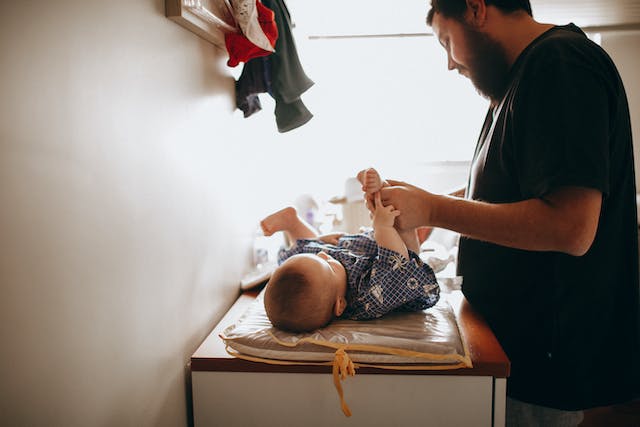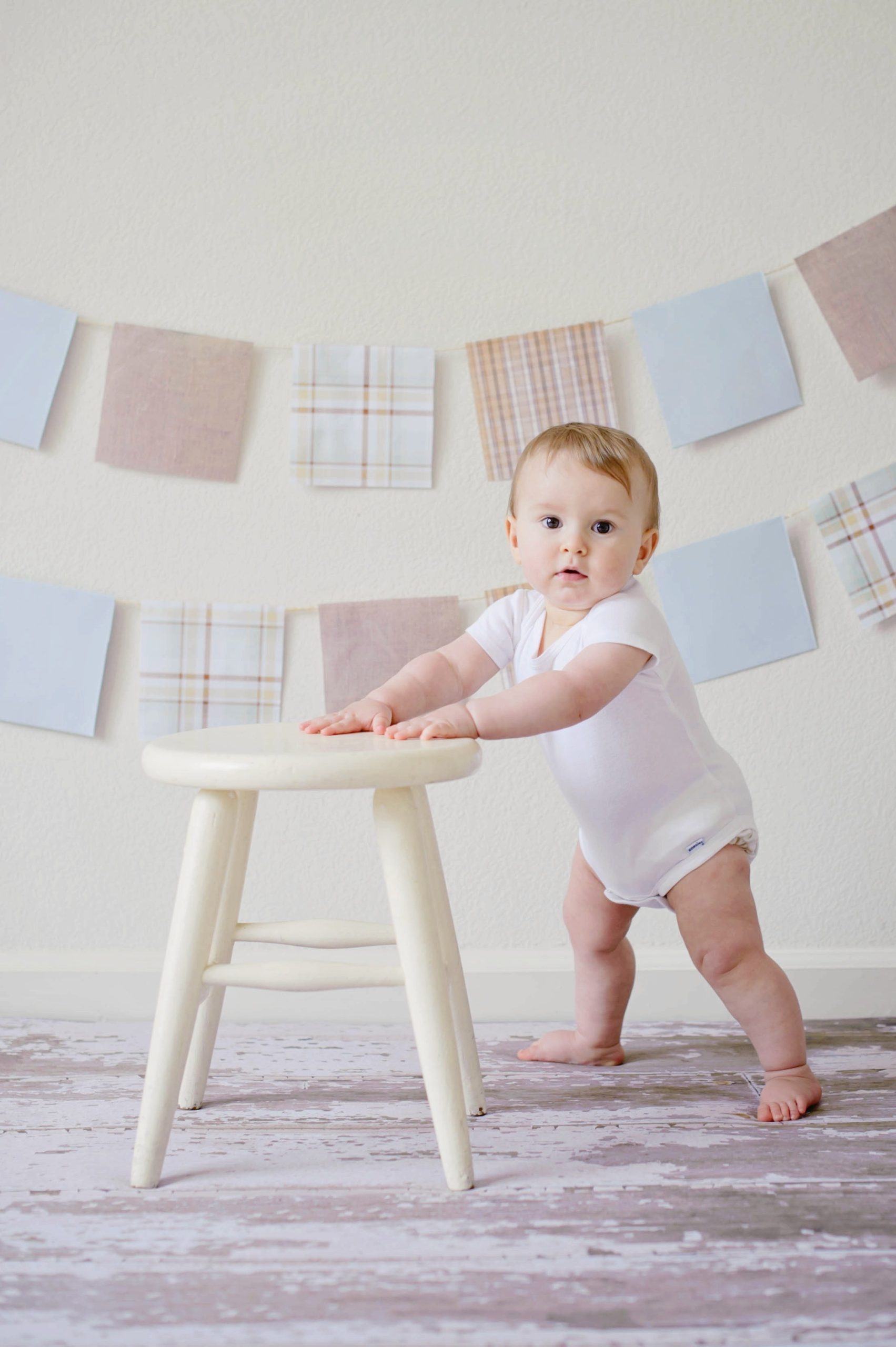Table of Contents
Overview
Seeing green poop in your baby’s diaper can be alarming for any parent. But before you hit the panic button, it’s important to understand that green poop in infants is often nothing to worry about. In fact, it’s quite common and usually harmless.
This article aims to shed light on the causes of green poop in infants and help you determine when it’s a cause for concern. We’ll explore various factors that can contribute to the color change, such as diet, breast milk, and certain medical conditions. We’ll also discuss other accompanying symptoms to watch out for, as well as provide practical tips on how to alleviate any discomfort your baby may be experiencing.
When to Start Solid Food for babies and FAQs
Arming yourself with knowledge can help ease the worry and provide you with peace of mind.
9 Common causes of green poop in infants
Some common causes of green poop in infants includes:
1. Dietary Changes:
Green poop can result from the introduction of new foods or dietary changes. If your baby has recently started solid foods or has consumed foods with green pigments, such as spinach, peas, or green beans, it can affect the color of their stool.
2. Fore-milk and Hind-milk Imbalance
In breastfed infants, green poop can occur if there’s an imbalance between the fore-milk (the initial, watery milk) and the hind-milk (the richer, fatty milk). This can happen if the baby doesn’t feed long enough on one breast or if there’s oversupply of milk. It’s not typically a cause for concern unless accompanied by other issues.
3. Iron Supplements
Some infant iron supplements can cause green poop. If your baby is taking an iron supplement, consult your healthcare provider to rule out this possibility.
4. Medications
Certain medications taken by the mother or baby can affect the color of the baby’s stool, including antibiotics and some antacids.
5. Formula Feeding
Formula-fed infants may have green poop due to the specific formula they are using. If you notice a consistent green color, consult your pediatrician to determine if a different formula is needed.
6. Gastrointestinal Development
As an infant’s digestive system matures, there can be temporary changes in stool color. Green poop can be one of these variations.
7. Teething
Some parents have reported greenish stools in their babies during teething, although there isn’t strong scientific evidence to support this link.
All about first month of a baby after birth, what can you expect?
8. Viral or Bacterial Infections
In some cases, infections in the digestive tract can lead to green stool. However, this is usually accompanied by other symptoms like diarrhea, fever, or vomiting.
9. Hypersensitivity or Food Allergies
In rare cases, green poop can be related to food allergies or hypersensitivity in the baby, but this is often accompanied by other symptoms like fussiness, rash, or digestive discomfort
Reason of Green Poop in Breastfeed Infants
Breastfed babies often have poop that ranges in color, texture, and consistency. It’s perfectly normal for breastfed babies to have green poop occasionally. This can be attributed to the mother’s diet, as mentioned earlier. If you’ve recently introduced new foods into your diet or consumed foods with strong colors, it can affect the color of your breast milk and subsequently the color of your baby’s poop.
Green poop in breastfed babies is usually not a cause for concern. As long as your baby is feeding well, gaining weight, and showing no other signs of illness, there’s typically no reason to worry. However, if your baby’s poop is consistently green and they’re experiencing other symptoms like fussiness or diarrhea, it’s best to consult your pediatrician for further evaluation.
Reason of Green poop in bottle feed babies
If your baby is formula-fed, green poop can be more common due to the iron content in infant formulas. In most cases, this is considered normal and not a cause for concern. The iron in the formula can cause the stool to turn green or even dark green. As long as your baby is thriving, gaining weight, and not experiencing any other concerning symptoms, there’s usually no need to worry.
Do you feel anxiety during pregnancy? 11 ways to deal with it
However, if your baby’s poop is consistently green and they’re experiencing other symptoms like excessive crying, vomiting, or signs of dehydration, it’s important to consult your pediatrician. These symptoms may indicate an underlying issue that requires medical attention.
9 Ways to prevent green poop in infants?
you can take some steps to promote healthy digestion and minimize the likelihood of green-colored stools:
1. Breastfeeding
If you’re breastfeeding your baby, ensure that they are latching properly and feeding well. A balanced breast milk supply can help maintain the normal color of baby poop.
2. Formula Feeding:
If you’re formula feeding your baby, consult your pediatrician to select a suitable formula. Some formulas may cause green poop, so choosing the right one can help prevent this.
3. Dietary Changes:
If your baby is consuming solid foods, introduce new foods gradually and one at a time. This can help identify if a particular food is causing green stools.
4. Monitor Mom’s Diet:
If you’re breastfeeding, be aware that certain foods you consume may affect the color of your breast milk and subsequently your baby’s poop. Foods like spinach or other leafy greens can lead to green poop. Keep track of your diet and note any changes in stool color when you eat certain foods.
15 Best Montessori toys for 6-month-old babies and toddlers
5. Balanced Diet:
As your baby transitions to solid foods, aim for a balanced diet that includes a variety of fruits, vegetables, grains, and proteins.

6. Proper Hydration:
Ensure your baby is adequately hydrated, especially in hot weather. Dehydration can affect stool color.
7. Lactose Intolerance:
If your baby exhibits other signs of lactose intolerance (like excessive gas, diarrhea, or fussiness), consult with your pediatrician. They can provide guidance and recommend lactose-free or lactase enzyme-drop supplements if necessary.
8. Pediatrician Guidance:
Regular check-ups with your pediatrician can help monitor your baby’s growth and development. They can also address any concerns about stool color and provide guidance on infant nutrition.
9. Medication and Supplements:
If your baby is on medications or supplements, discuss with your pediatrician to rule out any medication-related factors that might be affecting the color of their stools.
How and when to start baby on solids. Sample schedule to follow.
When to be concerned about green poop?
Here are some guidelines for when to seek medical advice:
Consistent Green Poop:
If your baby’s poop is consistently green and remains so for several days or is the predominant color, it’s a good idea to consult a healthcare professional.
Other Symptoms:
If your baby has other symptoms along with green poop, such as diarrhea, vomiting, fever, irritability, or refusal to feed, you should seek medical attention.
Blood in Stool:
If you notice blood in your baby’s green poop, even if it’s just a small amount or specks of blood, contact a healthcare professional immediately.
Change in Poop Color:
If the green poop is a sudden change from your baby’s normal poop color and consistency, it’s a reason for concern and should be discussed with a healthcare provider.
Feeding Changes:
If you’ve recently made changes to your baby’s diet, such as introducing new foods or switching formula, green poop might be a reaction to those changes. However, it’s still a good idea to discuss this with a healthcare professional to rule out any potential issues.
Concerns About Milk Supply:
For breastfed infants, green poop can sometimes be associated with an imbalance in fore-milk and hind-milk. If you’re concerned about your milk supply or your baby’s feeding habits, consult a lactation consultant or pediatrician for guidance.
Persistent Green Poop:
If green poop persists for more than a week without an obvious cause, it’s a good idea to consult a healthcare professional for further evaluation.
Unusual Odor or Texture:
If the green poop has an unusual odor or texture, it may be a sign of a digestive issue or infection, and it’s important to seek professional advice.
When to consult a healthcare professional?
If you’re ever unsure or concerned about your baby’s green poop, it’s always best to consult a healthcare professional. Your pediatrician can provide guidance and reassurance, ensuring that your baby receives the appropriate care if needed. They can evaluate your baby’s symptoms, conduct any necessary tests, and provide a proper diagnosis.
Remember, as a parent, it’s better to be safe than sorry. Trust your instincts and don’t hesitate to seek medical advice when needed.
Conclusion: Understanding and managing green poop in infants
In conclusion, green poop in infants is often normal and nothing to worry about. It can be caused by various factors, such as the mother’s diet in the case of breastfed babies or the iron content in formula for formula-fed babies. Understanding these causes can help ease your worries and provide you with peace of mind.
However, there are instances where green poop may indicate an underlying issue, especially when accompanied by other concerning symptoms. If your baby has persistent green poop along with symptoms like diarrhea, vomiting, fever, or blood in the stool, it’s important to consult your pediatrician.
Remember, as a parent, you know your baby best. Trust your instincts and seek medical advice when needed. By understanding and managing green poop in infants, you can ensure the well-being and health of your little one.





